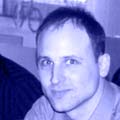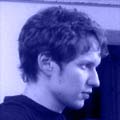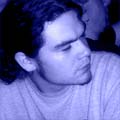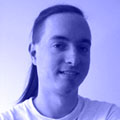
| home/news · about the party · competitions, seminars & events · more · after the party |
Seminars
For the first time in 2005, Breakpoint is going to host a huge selection of high-quality seminars and workshops during the party. Join them to expand your knowledge in scene technology, to get an inside look of what's hot and cooking, and to ask all the questions you never dared to ask.
While the speakers list below is extensive, it's not really complete yet - two of our sponsors have announced to be holding workshops, too. These are going to be announced at a later time.
 |
Heinz Bast / Intel Corporation "Intel Software Developer Tools for Demo Tuning" Heinz Bast is working for Intel Corporation in the German, Munich based headquarter. After studying computer science, he spent a couple of years working in on high-performance computing projects like semi-automatic parallelization of scientific programs. He joined Intel in 1992 working initially with Intel Supercomputer System Division. Currently he is part of Intel's Software and Solution Division (SSG) where he supports Independent Software Developers on getting their application ported and optimized for the latest Intel architectures. After a brief overview on the whole suite of Intel® Software Developer products including compilers, libraries and tuning tools, the Intel® Vtune™ Performance Analyzer will be presented in some detail. Using a typical open-source multimedia code as a sample application, the session will demonstrate how to use the Vtune™ tool to facilitate performance tuning by exploiting the information made available through the Performance Monitoring Hardware of modern processor architectures like the Intel Pentium(4) processor. intel.de |
 |
Prof. Dr. rer. nat. Alexander Keller / Universität Ulm "To trace or not to trace - that is the question." Alexander Keller is a professor for computer graphics at the University of Ulm in Germany. Some of his main research areas include interactive production quality rendering, Monte Carlo and quasi-Monte Carlo methods and highly uniform point sets. In the last twelve years he was involved in several graphic or image based research projects. Rasterization has limitations that cannot be overcome, whereas ray tracing offers the full freedom. We present the state of the art in fast ray tracing (FART) graphics.uni-ulm.de iray.de |
 |
Markus 'TRiNiTY' Glanzer / Sony Computer Entertainment Europe Technology Group (UK) "PSP™, unleash the beast..." TRiNiTY started on the C64 and the Amiga as a coder. Through demoscene parties he found the PSX, which then became his real addiction. He started working as a game programmer on the Playstation and the GBA in Great Britain. The porting of "James Pond 2: Robocod" was one of his projects. After that he started working for Sony Computer Entertainmant Europe, where he now does developer support for the PSP. Experience the future of handheld gaming systems and how to develop State Of The Art games that fit in your jacket's pocket. www.technology.scee.net |
 |
Jens Schönfeld / Individual Computers "C-ONE, Reconfigurable Computing" Jens Schönfeld is known best for the various impressive C64 and Amiga based hardware projects he designs and builds. He also supports other hardware designers by producing and distributing their hardware through his company Individual Computers. Jens is a long-time financial supporter of various scene-related projects and parties. Future computers don't need processors and graphics cards! Learn all about FPGAs and their role in future equipment by the example of C-ONE and the Catweasel MK4. jschoenfeld.de c-upgra.de |
 |
Christoph 'giZMo' Muetze / farbrausch "Softimage|XSI Kung Fu" giZMo started his demoscene career as part of the Acorn and Atari scene where he used to be a well-respected graphics artist for Icebird and tSCc. These days he has earned himself fame on the PC for his contributions to Farbrausch intros and demos like Candytron and the.popular.demo. He also is one of the driving forces behind the .werkkzeug project. In his daily life he works as a freelancer in graphic design. Take a quick tour through one of the most amazing animation packages out there! Realtime content creation in xsi knee deep - with a special eye on character development and animation... all you need to know to get your hands dirty ;) www.farbrausch.com theprodukkt.com www.pixelz.de |
 |
Dierk 'chaos' Ohlerich / farbrausch "Compilers and Assembler" Chaos is one of the best known and highest rated coders in the demoscene. Back in the days as a member of Sanity he did not only do never-forgotten demos on the Amiga, he also invented new techniques like the rotozoomer. He continued his work on the PC and supplied important parts for some of the best known demos and intros of the scene and set new standards with demotools like .werkkzeug. In his day job he works as a game developer at 49 Games. Oldschool demo coders used to write everything in assembler - today even 4k-intros are written in c++. The compiler is the most important tool of the programmer, and those who seek optimum performance in time and space should examine carefully what the compiler does. This seminar shows which c++-constructs generate good code and which don't, focussing on Microsoft Visual C++. The requirements of intro-programming and 3d computer graphics raise their own questions. "Inline assembly" and "intrinsics" are presented, and one should consider the CPU: optimised assembler code looks quite different today than back in the oldschool times. www.farbrausch.com theprodukkt.com www.xyzw.de |
 |
Leonard 'paniq' Ritter / farbrausch "Mastering the Buzz Beat" Paniq has been tracking for about eight years now and has created over 150 pieces of electronic music in that timespan. He also coded tools to improve his music, exploring new techniques. He works as a coder and GUI designer. What phattens up a beat? Which elements get the audience grooving? In this seminar you will find out about the essentials of electronic music & groove composition and learn the basics of the popular Buzz modular tracker. www.farbrausch.com www.paniq.de |
 |
Jan C. 'jco' Obergfell / neuro.concept "Making more of moving images" In addition to his fame for writing electronic music, jco is known for making and directing short films. His projects are ranging from one man videos like "Visual approach to the aesthetics of techno" (which was nominated for the scene.org awards for best direction) to group works like the party winning videos "Fear of redemption" and "Out Back Into". His video productions have in common a very good direction and well thought out editing with an unbelievable synchronization. Outside of the scene, he studies computer science. Video processing is not a question of specialized (and unaffordable) hardware any more: The basics of working with digital video, a look at its potential and limitations, and a demonstration of greenscreening. www.jco-music.de |
 |
Clemens 'Peci' Pecinovsky / Scoopex "Normalmapping - problems and solutions" Peci started his demo-scene career on c64 and amiga although he first joined the scene in 1993 on pc. He studied computer science on the technical university of vienna and since 2003 in the computer games industrie as a programmer in 2003. Nowadays he is specialised in shader programming and sized optimized programming for 4k intros. There are a lots of demos in the net using normalmaps and it should be easy to use this technology in theory. But it is not - there are a lot of problems if you do not take care of several things. Starting with a short overview about normalmapping and how it works i will discuss the differences about object and tangent space normalmaps. The main topic will be the possible problems with tangent space normalmaps and what can be done to fix these or at least work around them. I will describe some methods how to create the normalmaps and give some hlsl shader code examples how to use them. This talk is targeted to artists creating models with normalmaps and for programmers developing the shader. |
 |
Tammo 'kb' Hinrichs / farbrausch "Practical softsynth design" kb surely is one of the best known scene musicians. He did impressive remixes of well known tunes like Turrican and Second Reality and own compositions for top ranked demos on the C64, for groups like The Obsessed Maniacs and Smash Designs. He continued his great work on the PC where he contributed the music top ranked intros and demos like SDS's "Sleepless" or farbrausch's "fr-08: .the .product" and "fr-030: Candytron". He wrote several articles about synthesizers and with V2 he has coded a softsynth for 64k intros. In his "normal" life he is a game developer at inverse entertainment. In this seminar you'll learn the basics of realtime software synthesizer design: Common DSP principles as well as the parts of a synthesizer and their role in creating music are explained using the well-known Farbrausch V2 system as an example. www.farbrausch.com www.kebby.org 1337haxorz.de |